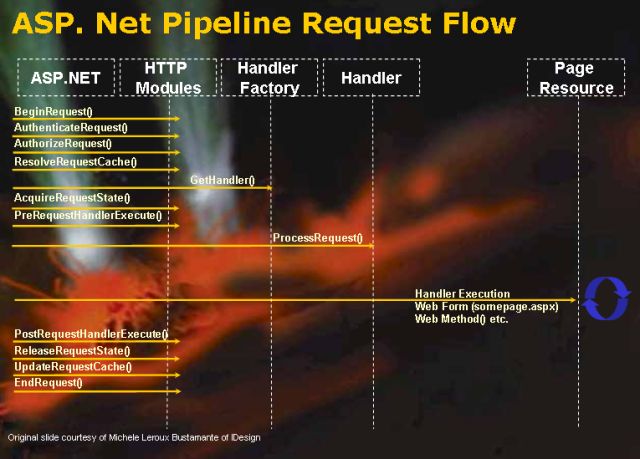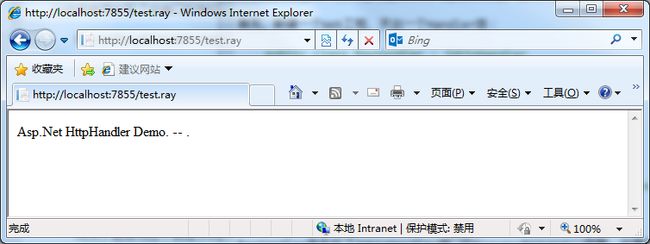Asp.Net IHttpHandler介绍
ASP.NET响应Http请求时常用的两个处理接口是IHttpHandler和IHttpModule。
一般的,IHttpHandler用来处理一类特定的请求,比如对每个*.asp, *.aspx文件的分别处理。而IHttpModule通常用来处理所以请求共同需要的操作,比如对所以请求页面进行某些相同的检查功能。
我们先来看一下IIS服务器在相应Http请求时的处理步骤。 ASP.NET中有管线(Pipeline)这个概念,意指每个ASP.NET请求在IIS中会有一系列相应操作串联起来形成的一条类似线一样的序列。
ASP.NET管线介绍
我们来看一下管线的处理时序图:
从图中看出,请求到达之后,实现经过HttpModule处理之后再调用HttpHandler的ProcessRequest()方法进行具体相应的。因此,也不难理解为什么说在HttpModule中做一些对所有请求通用的检查操作,而将特定类请求的处理放在HttpHandler类中。
代码实践
IHttpHandler
笔者最近在项目中接触到用IHttpHandler来实现对客户端接口调用的处理,这里便来简单探讨下基于IHttpHandler的简单接口设计。
IHttpHandler接口只有两个成员:
1 public interface IHttpHandler 2 { 3 bool IsReusable { get; } 4 void ProcessRequest(HttpContext context); 5 }
IsReusable属性是标识改HttpHandler对象能否被其他实例使用,一般我们将其置为True。 ProcessRequest()方法则是具体的响应请求方法,我们只要将具体的业务逻辑操作放在这里即可。
首先,新建一个Web工程,添加一个Handler类:
1 public class RayHandler : IHttpHandler 2 { 3 public bool IsReusable 4 { 5 get { return true; } 6 } 7 8 public void ProcessRequest(HttpContext context) 9 { 10 context.Response.Write("Asp.Net HttpHandler Demo. -- ."); 11 } 12 }
RayHandler类实现了IHttpHandler接口的ProcessRequest()函数,这里只是直接输出一条文本。
然后,我们需要在Web.config文件中添加以下配置:
<handlers> <add name="test" path="*.ray" verb="*" type="WebApplication2.RayHandler,WebApplication2"/> handlers>
path表示URL匹配,如*.ray这表示该Handler会响应所以以".ray"结尾的URL请求,verb表示请求方法,如Get/Post,使用*则表示所以匹配所有。type指示Handler类的类型,WebApplication2.RayHandler是类名,WebApplication2是指Bin目录下该该程序集的名称,如示例中的程序集名称为WebApplication2.dll,且这里不需要制定后缀名。
启动站点,输入以".ray"结尾的URL,可以看到如下结果:
IHttpHandlerFactory概述
有时候我们可能需要处理多种不同的后缀,一个后缀对应一个Handler类,这时我们的Web.config文件看起来就是这样了:
<handlers> <add name="test" path="*.ray" verb="*" type="WebApplication2.RayHandler,WebApplication2"/> <add name="test1" path="*.rss" verb="*" type="WebApplication2.RssHandler,WebApplication2"/> handlers>
如果我们有很多的HttpHandler实现类,那么我们的Web.config文件配置势必会显得很冗长。或者在某些情况下,我们只有当程序运行时才能确定哪个Handler进行响应时,这个时候就需要使用IHttpHandlerFactory了。
IHttpHandlerFactory的定义如下:
public interface IHttpHandlerFactory{ IHttpHandler GetHandler(HttpContext context, string requestType, string url, string pathTranslated); void ReleaseHandler(IHttpHandler handler); }
其中:
- GetHandler(): 返回一个实现了IHttpHandler接口的实例;
- ReleaseHandler():使得Factory可以重复使用一个已经存在Handler实例。
以上述ray,rss请求为例,实现Factory类:
1 public class HandlerFactory : IHttpHandlerFactory{ 2 public IHttpHandler GetHandler(HttpContext context, string requestType, string url, string pathTranslated){ 3 IHttpHandler handler = null; 4 string path = context.Request.PhysicalPath; 5 switch(Path.GetExtension(path)){ 6 case ".ray": 7 handler = new RayHandler(); 8 break; 9 case ".rss": 10 handler = new RssHandler(); 11 break; 12 default: 13 break; 14 } 15 16 return handler; 17 } 18 19 public void ReleaseHandler(IHttpHandler handler){ 20 //void 21 } 22 }
这时,在Web.config中的配置如下:
<handlers> <add name="test1" path="*.ray,*.rss" verb="*" type="WebApplication2.FactoryHandler,WebApplication2"/> handlers>
这时就实现了用Factory类来对应不同的具体Handler的功能,简化了配置。
可扩展的IHttpHandlerFactory
上述的实现方式中,如果程序后续需要增加对新后缀的处理方法,就需要修改GetHandler()中的Switch语句,同样可能引发错误或带来其他安全隐患。那么,能否实现在后续扩展时,保持HandlerFactory类不变呢?
答案肯定是可以的。 熟悉设计模式的读者应该明白这里是一个简单工厂模式,要实现前面的功能我们用叫高级点的设计模式是可以实现的。
而在这里,我们还可以用C#语言的语言特性--反射。 通过C#的反射机制,我们根据URL的后缀来反射获取对应的Hanlder类型,只要我们将URL的后缀名跟Handler的类名约定一下对应关系即可。
如,我们对GetHandler()重写如下:
using System.Reflection; public IHttpHandler GetHandler(HttpContext context, string requestType, string url, string pathTranslated){ IHttpHandler handler = null; string path = context.Request.PhysicalPath; string className = this.GetType().Namespace + Path.GetExtension(path); try{ Type type = Type.GetType(className); if(type == null){ context.Response.Write(string.Format("找不到"{0}"对应的处理程序",Path.GetExtension(path))); } handler = (IHttpHandler)type.Assembly.CreateInstance(className); }catch(Exception ex){ context.Response.Write(string.Format("请求地址错误:"+ ex.Message)); handler = null; } return handler; }
此时,只需要将方法中的Handler类放在HandlerFactory类的同一命名空间下,且在Web.config中正确配置。如,有RayHandler类,那么在应该添加一个如下的配置才能自动匹配:
<handlers> <add name="test1" path="*.RayHandler" verb="*" type="WebApplication2.FactoryHandler,WebApplication2"/> handlers>
总结
本篇简单介绍了ASP.NET中IHttpHandler的用法,在多个Handler请求的处理方面,提供了IHttpHandlerFactory的实现方式,最后,利用C#的反射机制改进了一种可扩展的多请求Handler实现方式。

